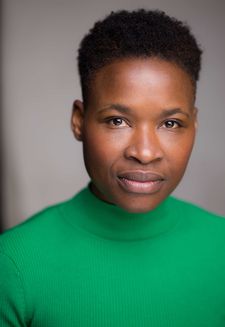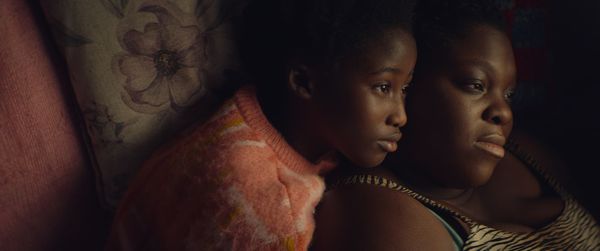You've previously worked with stage productions, and then adapted Expensive Shit as well for the screen. Were there any challenges in stepping up to a feature from a short and from stage work and if there are any freedoms that you got from sort of having more room to tell a story?
Adura Onashile: I think the biggest leap for me was scale, the amount of people involved, and both from a writing point of view, and then into the process of editing and heading towards picture lock, there is a lot of conversation. I think in theatre, it's a bit more straightforward. Like you have your dramaturg, maybe, your artistic director pretty much leaves you alone once they’ve given the script the greenlight. So that was a huge leap.
I was very nervous about the fact that I didn't know technical stuff about film - aspect ratios, the kinds of camera, all that stuff you like. And that was nerve-wracking, because it felt like that was important stuff to know. But then as I went along, I realised that my job was mostly about story, and the actors and the performances and what I wanted it to do visually, and that my job was to communicate that to my collaborators, and that the skill that they had was all the technical knowledge. But those were the sorts of things that were nervy.
I guess another thing that was a bit strange for me was that the turnaround between making the short and making the feature was quite fast. We shot the short, in March, 2020, we shot the feature in September 2021 and this was during the pandemic as well. So it was wild. I had started writing the feature three years before the short and five years by the time we kind of shot. So the feature was in my bones for a long time. But yeah, it was quick.
Do you think that the fact that you trained as and worked as an actor affects the way you approach your writing and even the way you would shoot the film?
 |
| Girl director Adura Onashile: A's an actor, I know that if you get the right cast, they don't have to say a lot to communicate what you need them to communicate' Photo: Jessica Hardwick |
Speaking of actors, Déborah Lukumuena is really distinctive, and very much up and coming in terms of the French film world, but I wondered how you came to cast her because, obviously, this is a Glasgow set movie, it's shot in English. So it’s a little bit unusual for her to be cast.
AO: My casting director, Isabella Dorfman, is a bit of a magician. We saw a few English actors, some good. And she said, ‘If this is an immigrant character, she doesn't have to be British. We know that she's accented in some way. Why don't we look at African actors based in Africa? Why don't we look at African actors based in Europe?’ So we opened up the casting and that's how we came across Deborah. I had seen Divines, so I knew of her work, but I would never have made the connection that she worked in English, that she was capable of doing that. And it was Isabelle that definitely opened that up for us. And I thought it was inspired. I think sometimes when we work in the UK with African immigrant stories, it can feel a little bit like we're getting into a bit of a stereotype in some of its depictions and Déborah, because she doesn't have the same cultural context as we do just came with something completely different and fresh and quiet. I loved that, because that's what the script asks for.
She’s got an amazing screen presence. Getting young actresses to work in that sort of space, especially with somebody as powerfully present as Déborah must have been quite tricky.
AO: I insisted on a kind of rehearsal process with just the two of them before shooting began, especially because of that, to try to get a complicity between the two of them. In theatre terms, it really wasn't enough, it was over three weeks, but it was half days. So really, they had a week and a half to kind of jump in and get into each other. But in the end, Deborah ended up really supporting Le’Shantey through some of the more difficult scenes. I think it was important that Le’Shantey, as an 11-year-old, was looking up to this more established, experienced actor. Sometimes as kids are, the energy would be all over the place before you call action, and then it was, ‘Action’, she would look at Deborah and everything would just go oof and they were in a space together and in it together. And I really thank Déborah for that because I think she as well as having to portray Grace, she also as a mother in the film, there was a kind of unspoken connection between her and Le’shantey that was kind of similar, to do with being shown the ropes of how to act without never saying it just being it and allowing this young girl to watch. But Le’Shantey came with her own energy as well, from her first video that she sent us. I was like, What is this? When she was quiet, you were just like, drawn in.
There's scenes with her and her friend that have such a different energy and I wondered how much of that is something that you're trying to create and how much is it just basically getting those two girls into a space and then allowing that energy to just sort of happen
I think for us to buy that the world that Le’Shantey was exploring was invigorating - it had to be it had to be opposite to what she had with her mom. It really had to be felt like that was really important. That you were watching a little, you know, a chrysalis change and kind of spread its wings. And we had a little bit of time in rehearsals as well, I think I think they had like, two half days or three half days, with Lana and Le’Shantey as well, just to get into a friendship. Le’Shantey hadn't done much but Lana had done a bit and she's definitely a theatre girl and a dancer. She definitely brought an energy. I guess Le’shantey, looking back, was able to really clock into whoever she was opposite and kind of take on their energy, which is a sign of a very good actor.
In a way, the film is all about closeness, but not always positive closeness, also in the way that closeness can mean a trauma that's breathing down your neck, even though a lot of years have passed. To what degree you sort of were thinking about that idea when you were writing the film?
What was really important for me to try to express was how great beauty can sit next to trauma and how the two can coexist. It seems unlikely, it seems impossible but that is definitely a reality that I had experienced in my own life. And I really wanted to express that through the film, and that there is a very fine line, like you say, between the tactility of love, and then the imprisonment of it as well. Those two things were super important to me. So I know this caused some consternation, but I wasn't into wide shots for that reason. I wanted to remove context and it wasn't always appreciated. We have to feel we have to feel that tension and the way to do that is to stay close to them all the time as much as possible.
You’re going to Sundance now, which is terrific, and then coming back to Glasgow, which must be even more in some ways even more terrific.
AO: I really can’t envisage either of them. But the Glasgow one feels so close, because this is my home and I love this city. It's magical that this film is opening that festival. It's wild. So much of my artistic development has been in this city. So much of being allowed to flex my muscles in different ways being treated like an auteur, in some ways, has been because of being in this city and the openness of the art scene and theatre scene.
Read what Adura Onashile told us about the use of light, costuming and the unusual score of Girl.
The opening gala screening of Girl is soldout at Glasgow Film Festival but tickets are still available for an added screening on Thursday, March 2 at 3.15pm in Glasgow Film Theatre. Studio Soho will distribute the film in the UK later this year






















